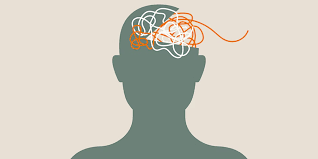“Anxiety Unveiled: Navigating the Complex Terrain of the Human Psyche”
Description
First of all,
Anxiety appears as a complicated and pervasive force, deeply woven into our thoughts, feelings, and behaviors, in the rich tapestry of human emotions. This thorough investigation aims to expose the complex and multifaceted characteristics of anxiety by exploring its various causes, comprehending its various expressions, and negotiating the difficult path to efficient treatment. Our objective as we begin this comprehensive investigation into the aspects of anxiety is to understand its significant effects on both individuals and society as a whole, in addition to unraveling its psychological complexities. We aim to open the door for compassionate care, de-stigmatization, and holistic approaches that value the richness and uniqueness of every person’s experience by analyzing the complexity of anxiety.
The Origins of Fear:
Deeply ingrained in the human mind, anxiety is a complicated reaction to perceived dangers that was first created for survival. But in the contemporary world, this reaction can turn maladaptive, resulting in persistent anxiety, agitation, and a pervasive feeling of unease. Anxiety disorders have a complex genesis that is influenced by the interaction of biological variables, such as heredity and neurotransmitter imbalances, with environmental factors, such as early life events and trauma. Comprehending this complex interplay serves as the basis for customized interventions and a more compassionate attitude towards those facing anxiety-related difficulties.
The Many Faces of Anxiety
Anxiety manifests itself in a variety of ways, each with distinct traits and effects. While panic disorders are marked by abrupt, severe episodes of dread accompanied by physical symptoms, generalized anxiety disorder (GAD) is defined by chronic, excessive worry about ordinary daily occurrences. The core of social anxiety disorder is an excessive dread of social settings, while specialized phobias are unreasonable worries of certain things or circumstances. It is essential to identify and classify these various manifestations of anxiety in order to create individualized treatment plans and recognize the complexity of each person’s experience.
The Relationship Between Anxiety and Psychology:
Anxiety is a complex psychological construct that extends beyond its biological foundations. Complex psychological processes, skewed cognitive patterns, and illogical concerns are some of the elements that make up anxiety. The grip of anxiety is further strengthened by catastrophic thinking and avoidance behaviors, which feed the vicious cycle of ongoing distress. Understanding the complex relationship between psychology and anxiety is crucial for developing therapeutic strategies that target the underlying thought processes that underlie anxiety as well as its symptoms.
Anxiety Neuroscience: Uncovering the Brain’s Function
Neuroscience discoveries shed light on the complex brain architecture behind anxiety disorders. A complex network that controls fear reactions is formed by interactions between the hippocampus, prefrontal cortex, and amygdala, which is an important component in emotional processing. Increased anxiety reactions may result from dysregulation in these circuits. Gamma-aminobutyric acid (GABA) and serotonin are two neurotransmitters that are important in controlling anxiety levels. Comprehending the neurology of worry not only enhances our comprehension of its intricacy but also provides guidance for pharmaceutical treatments intended to reestablish equilibrium in the brain.
Holistic Methods of Handling Anxiety:
Managing anxiety requires a thorough strategy due to its multidimensional character. Although medication can be very helpful in reducing symptoms, holistic approaches acknowledge that biological, psychological, and behavioral variables are all connected. A variety of techniques for managing anxiety include mindfulness exercises, lifestyle changes, and cognitive-behavioral therapy (CBT). Beyond just treating symptoms, resilience is encouraged, and general well-being is improved. A holistic approach recognizes that anxiety can affect all part of a person’s life and is not limited to a single moment.
Anxiety’s Effects on Society:
Beyond the individual, anxiety affects societal institutions and puts a load on healthcare systems. Anxiety disorders have a significant financial impact, including medical expenses and missed productivity. The acknowledgement of anxiety as a widespread mental health issue demands a thorough social reaction, encompassing initiatives to destigmatize the condition, increased accessibility to mental health resources, and education. Establishing a culture that places a high value on mental health helps create a more encouraging atmosphere for people who are dealing with anxiety.
Cultural Interactions and Gender Views:
Gender dynamics and cultural norms have a big impact on how anxiety is experienced and expressed. People’s perceptions of and attitudes toward mental health are influenced by societal norms, stigma, and cultural views around mental health and anxiety. Gender-sensitive methods to anxiety management are necessary, as evidenced by research showing variations across genders in the frequency and expression of worry. Given the variety of ways that anxiety is experienced and communicated, a comprehensive awareness of these cultural dynamics and gender perspectives is essential to promoting equitable and effective anxiety care.
Anxiety Coping Mechanisms:
It’s critical to investigate efficient coping mechanisms in addition to comprehending the intricate terrain of worry. Deep breathing and meditation are two mindfulness and relaxation practices that can help people control their anxiety’s acute symptoms. Regular physical activity has been demonstrated to elevate mood and lower general anxiety levels. Creating a solid support system and getting professional assistance through counseling or therapy are essential elements of long-term anxiety management. Acknowledging one’s own stressors and putting stress management strategies into practice might enable people to actively participate in their mental health.
In summary:
We explore the complex path of anxiety, revealing not only its biological roots but also the complex interactions between psychology, neurology, and society factors. Because anxiety is a multifaceted condition that defies easy explanations, treatment must be provided holistically. Through recognizing and tackling the various aspects of anxiety, our goal is to create space for considerate, knowledgeable, and efficient methods of managing anxiety that respect the complexity and uniqueness of every person’s experience.








Leave feedback about this
You must be logged in to post a review.